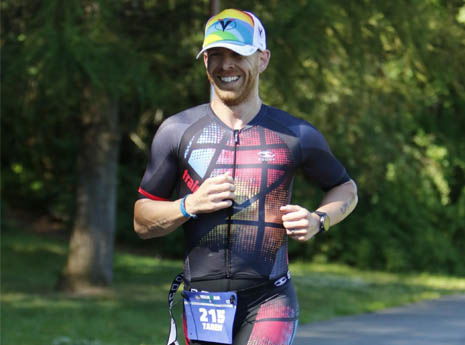When beginner triathletes get into the sport, the most difficult thing is learning to swim without panicking, losing their breath or sinking. This potentially difficult learning curve is a rite of passage for most triathletes; unfortunately, some struggle more than others to get comfortable in the water because they don't have the right approach.
Going about swim training the wrong way can leave an athlete stuck, making very little progress and constantly treading water in the absolute beginner stages of triathlon swimming. These are the biggest things I see new triathletes doing—things that hold them back from making progress.
Mistake No. 1: Starting Without a Plan
Triathletes are typically driven people who approach everything with enthusiasm and a belief that with enough effort they can accomplish anything. In running and cycling, this can be a great approach to take, but it's not the case with swimming.
Because swimming is such a technique-driven sport, athletes who start with the belief that they'll do well in the swim just by swimming more (or worse yet, by overpowering the water) will work very hard for not a lot of gain. Instead, triathletes need to start with a plan to get comfortable in the water using small, controlled drills that will teach them how to control their breath and swim calmly.
Mistake No. 2: Not Using Pool Toys
When athletes jump into the sport, they're often overwhelmed by the sheer amount of gear they need to buy. Bikes, running shoes, wetsuits, a helmet; it all adds up quickly. This often leads to trying to save money by cutting out some inexpensive swim training tools that can make learning to swim a whole lot easier.
Relative to cycling and running, swimming is a pretty cheap sport. A pair of tight swim shorts, a set of fins, a snorkel and a pull buoy might only cost $100 total, but those items will make an immense difference when used properly. They can be the key to a new triathlete ultimately finding comfort in the water.
MORE: 15 Swim Toys for Triathletes
Mistake No. 3: Using Pool Toys the Wrong Way
The flip side of the previous point is when triathletes use pool toys blindly without an understanding of the right version of the toy to use or exactly how to use it.
For example, short fins are great for Michael Phelps and his leg strength, but they're not great for amateur triathletes. Pull buoys, when used by themselves, create a hinge in the body, making the body wiggly and more likely to sink.
Look for good advice on the types of pool toys particularly ideal for amateur triathletes, and find out how to use them. Hint: Just watching someone else use toys won't help here because I would estimate most people use incorrect pool toys or use the right pool toys in the wrong ways.


